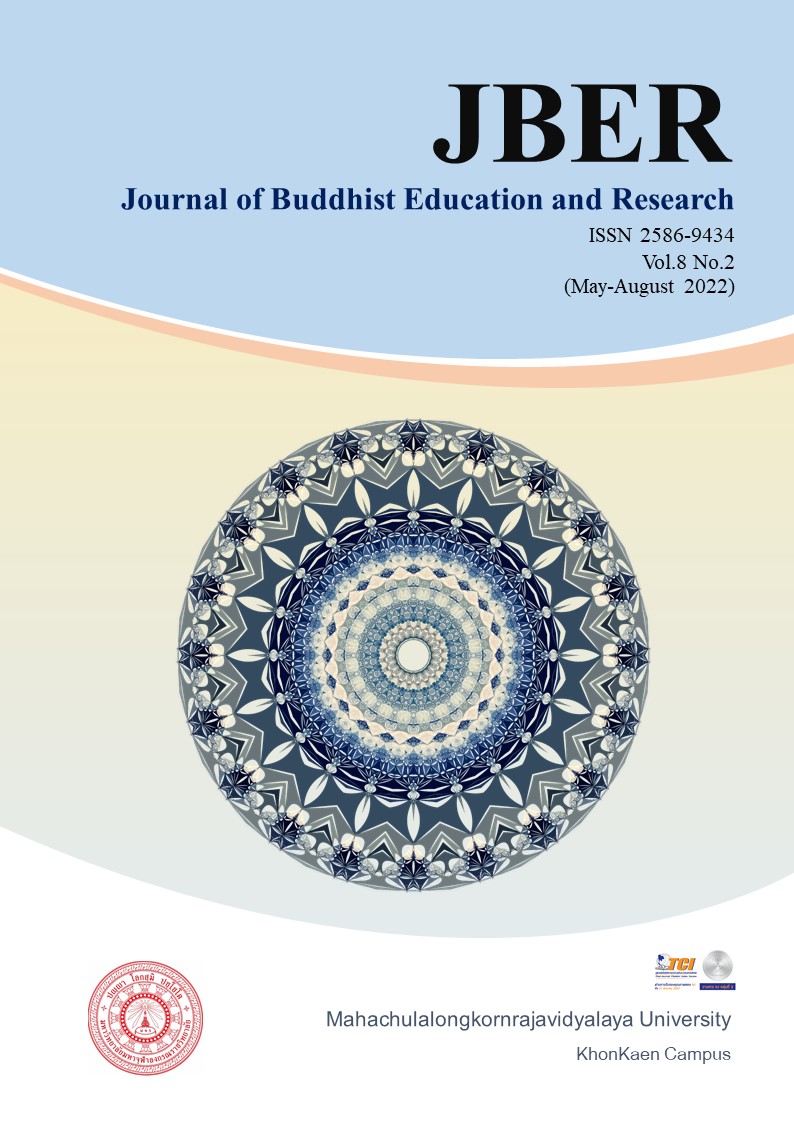การพัฒนากิจกรรมการเรียนรู้ที่ส่งเสริมความสามารถในการคิดแก้ปัญหาเชิงอนาคตสำหรับนักเรียนชั้นมัธยมศึกษาปีที่ 1
คำสำคัญ:
กิจกรรมการเรียนรู้, ความสามารถ, การคิดแก้ปัญหาเชิงอนาคตบทคัดย่อ
การวิจัยในครั้งนี้มีจุดมุ่งหมายเพื่อ 1) สร้างและหาดัชนีประสิทธิผลของกิจกรรมการเรียนรู้ที่ส่งเสริมการคิดแก้ปัญหาเชิงอนาคต สำหรับนักเรียนชั้นมัธยมศึกษาปีที่ 1 และ 2) ศึกษาผลการจัดกิจกรรมการเรียนรู้ที่ส่งเสริมการคิดแก้ปัญหาเชิงอนาคต สำหรับนักเรียนชั้นมัธยมศึกษาปีที่ 1 โดยศึกษาระดับความสามารถในการคิดแก้ปัญหาเชิงอนาคตหลังเรียน และเปรียบเทียบความสามารถในการคิดแก้ปัญหาเชิงอนาคต ก่อนและหลังเรียน
ดำเนินการวิจัย 2 ขั้นตอน คือ 1) สร้างและหาดัชนีประสิทธิผลของกิจกรรมการเรียนรู้ที่ส่งเสริมการคิดแก้ปัญหาเชิงอนาคต 2) ศึกษาผลการจัดกิจกรรมการเรียนรู้ที่ส่งเสริมการคิดแก้ปัญหาเชิงอนาคตกับนักเรียนชั้นมัธยมศึกษาปีที่ 1 จำนวน 20 คน จำนวน 17 ชั่วโมง วิเคราะห์ข้อมูลโดยใช้สถิติค่าเฉลี่ย ส่วนเบี่ยงเบนมาตรฐาน ค่าสถิติ t-test และค่าร้อยละ
ผลการวิจัยพบว่า
1. กิจกรรมการเรียนรู้ที่ส่งเสริมความสามารถในการคิดแก้ปัญหาเชิงอนาคต สำหรับนักเรียนชั้นมัธยมศึกษาปีที่ 1 มีองค์ประกอบดังนี้ ชื่อกิจกรรมการเรียนรู้ จุดมุ่งหมายของกิจกรรมการเรียนรู้ เนื้อหากิจกรรมการเรียนรู้ กระบวนการจัดกิจกรรมการเรียนรู้ สื่อการเรียนรู้ การวัดและประเมินผล โดยกิจกรรมการเรียนรู้ที่พัฒนาขึ้นมีความเหมาะสมอยู่ในระดับมากที่สุด (X= 4.74, S.D.= 0.38) และมีค่าดัชนีประสิทธิผลเท่ากับ 0.5821
2. ผลการจัดกิจกรรมการเรียนรู้ที่ส่งเสริมความสามารถในการคิดแก้ปัญหาเชิงอนาคต สำหรับนักเรียนชั้นมัธยมศึกษาปีที่ 1 สรุปได้ดังนี้
2.1 ความสามารถในการคิดแก้ปัญหาเชิงอนาคต ของนักเรียนชั้นมัธยมศึกษาปีที่ 1 หลังเรียน โดยกิจกรรมการเรียนรู้ที่ส่งเสริมความสามารถในการคิดแก้ปัญหาเชิงอนาคต อยู่ในระดับมาก (ร้อยละ 75.63)
2.2 ความสามารถในการคิดแก้ปัญหาเชิงอนาคต ของนักเรียนชั้นมัธยมศึกษาปีที่ 1 หลังเรียนสูงกว่าก่อนเรียนอย่างมีนัยสำคัญทางสถิติที่ระดับ .05
เอกสารอ้างอิง
กระทรวงศึกษาธิการ. (2551). เอกสารประกอบหลักสูตรแกนกลางการศึกษาขั้นพื้นฐานพุทธศักราช 2551 ตัวชี้วัดและสาระการเรียนรู้แกนกลาง กลุ่มสาระการเรียนรู้สังคมศึกษา ศาสนาและวัฒนธรรม ตามหลักสูตรแกนกลางการศึกษาขั้นพื้นฐานพุทธศักราช 2551. กรุงเทพฯ: โรงพิมพ์ คุรุสภาลาดพร้าว.
กรมวิชาการกระทรวงศึกษาธิการ. (2551). เอกสารประกอบหลักสูตรการศึกษาขั้นพื้นฐาน พุทธศักราช 2551. กรุงเทพฯ: โรงพิมพ์คุรุสภาลาดพร้าว.
ชัยวัฒน์ สุทธิรัตน์. (2561). 80 นวัตกรรมการจัดการเรียนรู้ที่มุ่งเน้นผู้เรียนเป็นสำคัญ.(พิมพ์ครั้งที่8). กรุงเทพฯ:พีบาลานซ์แอนปริ้นติ้ง.
พิมพ์ชนก แพงไตร. (2558). การพัฒนากิจกรรมการเรียนรู้ด้วยกระบวนการคิดแก้ปัญหาอนาคตตามแนวคิดทอแรนซ์ เรื่อง อาหารและการดำรงชีวิต เพื่อส่งเสริมความคิดสร้างสรรค์ สำหรับนักเรียนชั้นมัธยมศึกษาปีที่ 2. วิทยานิพนธ์ระดับปริญญาศึกษาศาสตรมหาบัณฑิต. สาขาวิชาหลักสูตรและการสอน. มหาวิทยาลัยนเรศวร.
พิพัฒน์ พบูลยวัฒนกิจ (2559). การพัฒนาผลสัมฤทธิ์ทางการเรียนและการคิดแก้ปัญหาอนาคตโดยใช้รูปแบบการจัดการเรียนรู้แบบการคิดแก้ปัญหาอนาคตตามแนวคิดของทอร์แรนซ์สำหรับนักเรียนชั้นมัธยมศึกษาปีที่ 5. วิทยานิพนธ์ระดับปริญญาศึกษาศาสตรมหาบัณฑิต. มหาวิทยาลัยศิลปากร
Torrance, (1985). A methodological study of the torrance tests of creativity. Retrieved July 12, 2020 from https://onlinelibrary.wiley.com/doi/abs/10.1111/j.1745-3984.1985.tb01044.x





